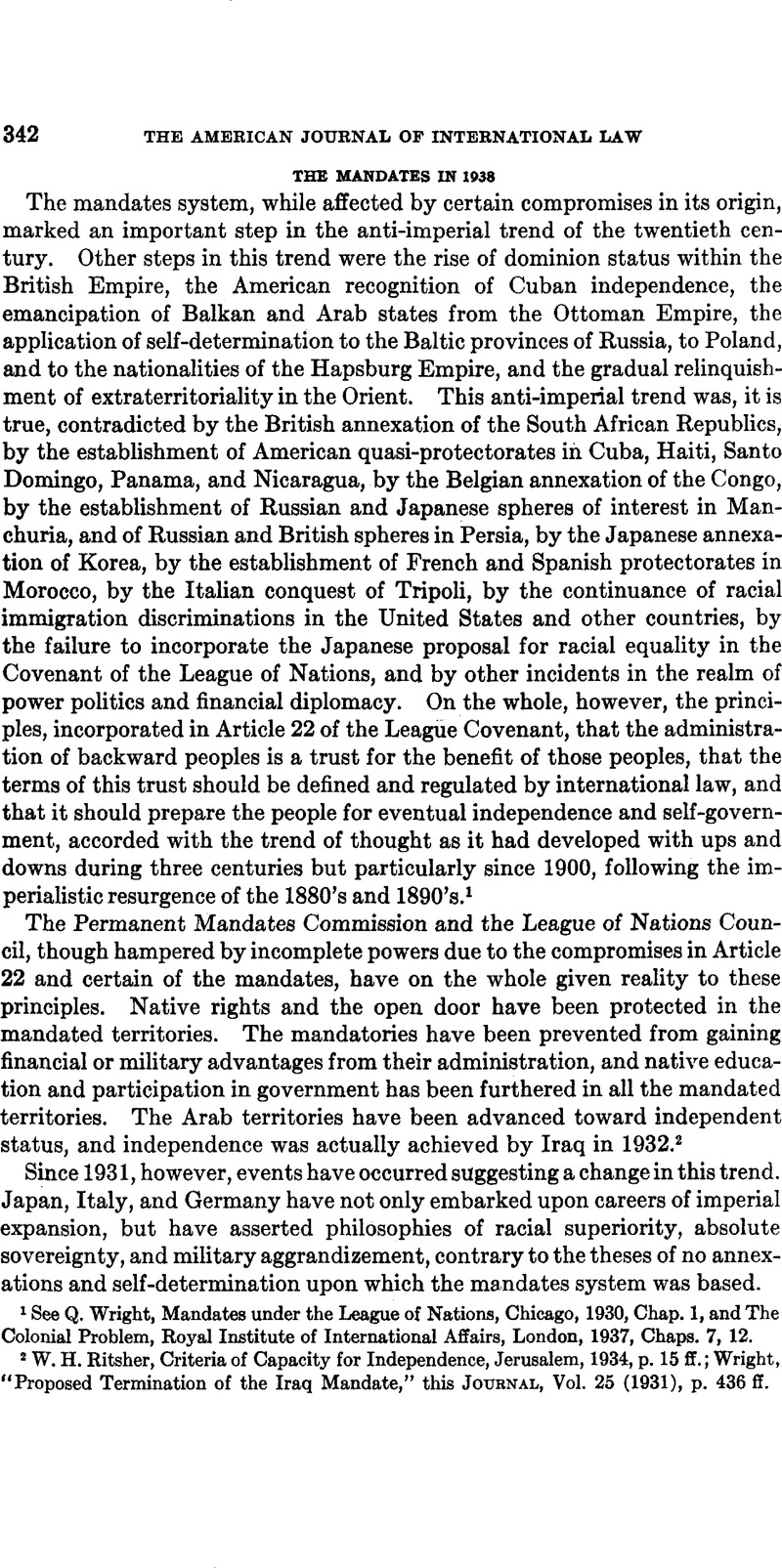No CrossRef data available.
Article contents
Abstract

- Type
- Editorial Comment
- Information
- Copyright
- Copyright © The American Society of International Law 1939
References
1 See Wright, Q., in Mandates under the League of Nations, Chicago, 1930, Chap. 1Google Scholar, and The Colonial Problem, Royal Institute of International Affairs, London, 1937, Chaps. 7, 12.
2 Ritsher, W. H., in Criteria of Capacity for Independence, Jerusalem, 1934, p. 15ff.Google Scholar; Wright, , “Proposed Termination of the Iraq Mandate,” this Journal, Vol. 25 (1931), p. 436 Google Scholar ff.
3 League of Nations, Permanent Mandates Commission, Minutes, 34th Sess., 1938, p. 228.
4 League of Nations, Perm. Mand. Com., Minutes, 34th Sess., 1938, pp. 31, 34.
4a See “The Palestine Conference in London,” Royal Institute of International Affairs, Bulletin of International News, Feb. 25, 1939, pp. 141-151.
5 Perm. Mand. Com., Min., 34th Sess., p. 228.
6 Ibid., 35th Sess., p. 71.
7 Perm. Mand. Com., Min., 35th Sess., p. 70.
8 Ibid., p. 71.
9 Perm. Mand. Com., Min., 35th Sess., pp. 73-74.
10 Ibid., pp. 202-203.
11 The writer has dealt with some of the earlier incidents in Mandates under the League of Nations, p. 204 ff.; “The Palestine Problem,” Pol. Sci. Quar., Sept. 1926, Vol. 41, pp. 381–412 Google Scholar; “The Bombardment of Damascus,” this Journal, Vol. 20 (1926), p. 263 ff. More recent incidents are dealt with in the Palestine Royal Commission Report, July, 1937, Cmd. 5479; Royal Institute of International Affairs, Great Britain and Palestine, 1915-1936, N. Y., 1937; Foreign Policy Association Reports, June 1, 1937 (Strategy in the Mediterranean), Nov. 1, 1937 (Liquidating the Palestine Mandate), as well as the annual reports of the mandatories and the minutes of the Permanent Mandates Commission. A good account from the Zionist point of view is Herbert Sidebotham, Great Britain and Palestine, N. Y., 1937, and from the Arab point of view, George Antonius, The Arab Awakening, London, 1938.
12 Perm. Mand. Com., Min., 34th Sess., p. 229. This question arose from a Japanese statement in 1935, that after its withdrawal from the League it continued entitled to economic equality in the mandated territories because of its position as a “Principal Allied and Associated Power.” Ibid., 28th Sess., pp. 183-184.
13 Ibid., 35th Sess., p. 231.
14 Ibid., pp. 15, 171.
15 The writer has discussed the legal effect upon the Japanese mandate of Japan’s with drawal from the League in this Journal, Vol. 27 (1933), p. 515 ff., and British Year Book of International Law, 1935, p. 104 ff. See also Japanese statement upon its withdrawal from the League suggesting a linkage between its “continuing to cooperate in the matter of mandates with the League of Nations” and its enjoyment of “economic equality” and other advantages in all the mandated territories. (Perm. Mand. Com., Min., 28th Sess., p. 184.) See discussion of this question and of the status of the Japanese mandated territory by the commission. (Ibid., pp. 126, 135.)
16 Ibid., 35th Sess., p. 13.
17 Perm. Mand. Com., Min., 35th Sess., p. 208.
18 Mandates under the League of Nations, pp. 436-437.
19 Supra, note 15.
20 Perm. Mand. Com., Min., 35th Sess., pp. 171-173.
21 Allusion has in recent years been made to the expensive harbor dredging operations at Saipan, the island nearest to Guam; to the difficulty of foreigners gaining access to the islands; to the decline in native population; and to the utilization of the territories’ revenues. See Perm. Mand. Com., Min., 22nd Sess., pp. 114-115,179, 319, 367; 26th Sess., pp. 94, 206; 30th Sess., p. 211; 33rd Sess., p. 177. Wright, Q., this Journal, Vol. 27 (1933), p. 516 Google Scholar; Br. Year Book Int. Law, 1935, p. 110; Mandates under the League of Nations, p. 214.
22 Perm. Mand. Com., Min., 35th Sess., pp. 208-209.


